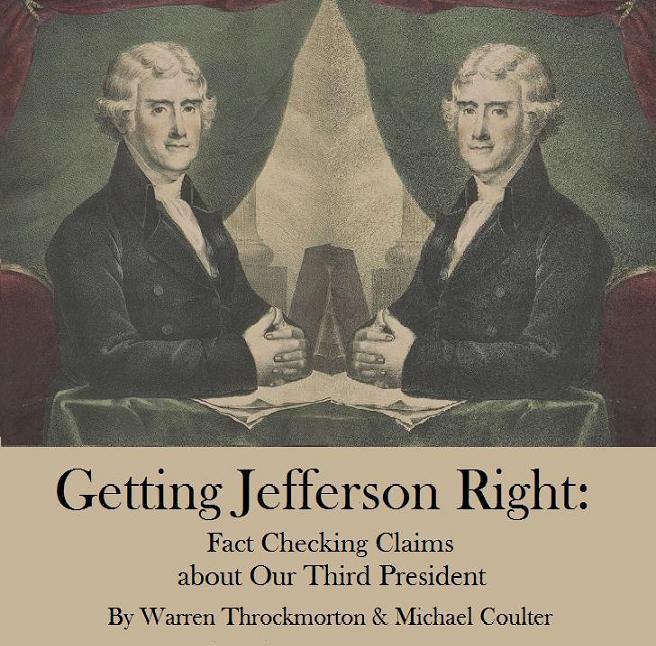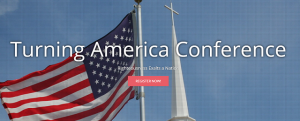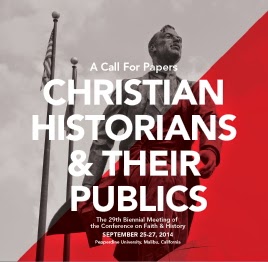
Although World Net Daily lists January 12 as the release date for the second edition of David Barton’s book The Jefferson Lies, it is now available on Amazon. I ordered the Kindle version and found a serious flaw within minutes of reading Barton’s response to our book Getting Jefferson Right.
Barton claims that I recruited Jay Richards to in turn recruit Christian historians to begin a campaign against Barton. That claim is not true. After reading Getting Jefferson Right, Richards approached me via Facebook message on May 14, 2012. Before that message, I did not know Richards. Here is what Barton says in The Jefferson Lies:
Throckmorton admitted that he had recruited scholars for this purpose, led by Jay Richards, a philosopher/theologian with the Discovery Institute, who, according to media outlets had asked “10 conservative Christian professors to assess Barton’s work.” Although he reported that their responses were “negative,” several of them actually refused to participate in his quest.
Barton, David (2015-12-22). The Jefferson Lies: Exposing the Myths You’ve Always Believed About Thomas Jefferson (Kindle Locations 133-137). WND Books. Kindle Edition.
Later in the book’s preface, Barton claims:
In fact, when Jay Richards (the speaker from the Discovery Institute who was enlisted by Throckmorton to find and recruit critics to attack my works) confronted me about what he claimed were errors in The Jefferson Lies, I repeatedly asked him if he had read the book. He refused to answer. But it was clear from his mischaracterization of my arguments that he had not read it (or at least all of it). For instance, he repeatedly asserted that I said that Jefferson was an evangelical, but as is clear in the chapter on Jefferson’s faith, I do not make that claim.
Barton, David (2015-12-22). The Jefferson Lies: Exposing the Myths You’ve Always Believed About Thomas Jefferson (Kindle Locations 613-617). WND Books. Kindle Edition.
In fact, Richards wrote to Michael Coulter and me on May 14, 2012 via the Getting Jefferson Right Facebook page. He thanked us for the book and offered to contact Christian journalists on our behalf. Then, on May 23, Richards wrote to say that he had spoken to two of Barton’s supporters about the historical problems in Barton’s book (see below for the identity of one of them which was revealed by Barton). The next day, Richards alerted me that he had been “commissioned” (it was unclear who did the commissioning, but it wasn’t me) to find six Christian historians to read Barton’s book, our book, and Barton’s DVD lecture America’s Godly Heritage. Richards then approached six scholars who then agreed to provide feedback. Richards did not tell me the identity of the scholars and I still don’t know all of them. The number providing some level of feedback eventually grew to ten.
According to Richards, Barton was also going to be informed that this process was happening.
Barton’s attempt to make me the one pulling all the strings is false and I think he knows it. I say this because on his Wallbuilders’ website, he tells the story differently. About one of the scholars recruited by Richards — The Masters’ College history professor Gregg Frazer — Barton says (see footnote 2):
From a hostile written review of David Barton and WallBuilders written by Gregg Frazer at the request of Jay Richards. That written critique was subsequently passed on to David Barton on August 13, 2012, by the Rev. James Robison, to whom Jay Richards had distributed it.
From Barton, we learn that Gregg Frazer was one of the historians recruited by Richards. Richards then gave the critique to Robison (co-author with Richards of the book Indivisible). Then, if Barton’s timing is correct, Robison gave Frazer’s critique to Barton on August 13, 2012, a few days after Thomas Nelson’s move to pull The Jefferson Lies from the shelves became public.
Not only is Barton’s claim about me false, the narrative he constructs appears to be designed to obscure what really happened. The Jefferson Lies was not doomed by political correctness, but rather by the deficiencies identified by conservative critics and reviewers. Conservative scholar Jay Richards came to us due to the merits of our work, not because we recruited him. In turn, Richards did not act alone in the effort to bring peer review to The Jefferson Lies.
For some reason, those who commissioned Richards apparently did not follow through in a vigorous manner on the information they received. This is a part of the story as yet untold although the removal of The Jefferson Lies from publication was influenced by Richards’ efforts.
This misrepresentation of recent history is just the first of many issues from the second edition of The Jefferson Lies I will explore in the coming months.

